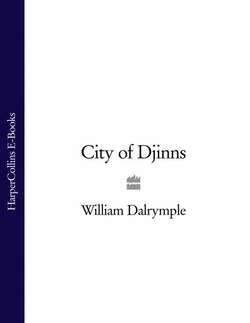Читать книгу City of Djinns - William Dalrymple - Страница 11
FIVE
ОглавлениеIN NOVEMBER, on the first night of the new moon of Kartika, Delhi celebrates Diwali, the Hindu Festival of Lights.
In the markets trestles go up selling little clay lamps and mountains of honey-soaked Bengali sweets. Postmen, telephone engineers and chowkidars tour the streets, knocking on doors and asking politely for their Diwali baksheesh. (Balvinder Singh, it must be said, opted for a more confrontational approach: ‘Mr William, tomorrow is holiday. Today you give me 200 rupees extra.’)
Every night during the week leading up to the festival the sky reverberates with a crescendo of thunderflash and fireworks. The pyrotechnics culminate in an ear-splitting, blitz-like barrage the night of Diwali itself. That evening every Hindu and Sikh house in Delhi is lit up with a blaze of candles; even the jhuggi-dwellers place one small nightlight outside their corrugated-iron doors. You can smell the thick cordite-smoke of the fireworks billowing in over the kitchen spices and the scent of dung fires.
Although it is a Hindu festival, many Muslims join in too; over centuries of co-existence the holidays of the two faiths have long become confused and mingled. On my way back from the Lodhi Gardens at dusk I saw two heavily-bearded men bowed in prayer on a small masonry dais by the roadside. Though it lay beside a path I walked along every day I had never previously noticed the tomb, hidden as it was by a thick covering of weeds and thorns.
The two men had cleared the undergrowth, covered their heads with pocket handkerchiefs, and were now busy placing a series of little oil lamps over its breadth; on the raised grave marker they hung a garland of marigolds. I asked the men whom the tomb commemorated. They replied that it belonged to Khwaja Nazir-ud-Din, a great Sufi from the time of the Emperor Akbar.
‘Are you imarns?’ I asked.
‘No, no,’ replied one of the men, lighting another low, wide oil lamp of prehistoric design. ‘We are working for Electricity Board.’
More comprehensible celebrations were being conducted around the square outside our house. Mrs Puri’s numberless grandchildren were scattered outside her gate throwing sparklers and Catherine wheels at each other. Next door, Mr Seth was letting off a volley of roman candles for the benefit of a gathering of portly-looking retired railway officials.
My landlady, however, refused to have anything to do with such extravagance. ‘Actually these fireworks are too costly,’ she explained when I met her on the stairs. ‘Money is not for burning.’
Mrs Puri, it emerged, adhered to a characteristically monetary interpretation of the Diwali festival. Most Hindus agree that Diwali marks the triumphant return of Ram and Sita to their north Indian capital, Ayodhya, following their successful war against Ravanna in Lanka; hence the festival’s date, some three weeks after the victory commemorated at Dusshera. But Mrs Puri would have none of it.
‘Mr William,’ she said. ‘You must understand that Diwali is a very important night for us.’
‘Why is that, Mrs Puri?’
‘Diwali is not about burning money,’ said my landlady, her eyes glinting. ‘It is about accumulating it.’
‘Oh?’
‘Diwali is the festival of Laxmi, the Goddess of Wealth,’ explained Mrs Puri. ‘If we light candles and leave our front door open, on this night Laxmi will come into our house and count all our moneys.’
